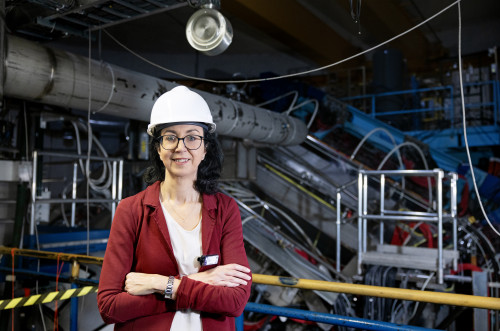After more than two decades, Jefferson Lab user Raffaella De Vita transitions to a permanent staff scientist position and continues a lifetime of contributions to CLAS. Jefferson Lab photo by Aileen Devlin.
Complex challenges and a large community draw in staff scientist
NEWPORT NEWS, VA – For more than 25 years, Raffaella De Vita explored the nature of matter at the U.S. Department of Energy's Thomas Jefferson National Accelerator Facility as a member of the Jefferson Lab User community. What started as a curiosity for a master’s thesis led to a lifetime of contribution to CLAS and CLAS12, the previous and current large acceptance spectrometer in the lab’s experimental Hall B.
Experiment after experiment, she found herself more engulfed in her research and the fascinating world of nuclear physics. From the beginning, she was attracted to the opportunity to learn something new every day and the accompanying challenge of understanding and finding solutions to problems that have never been faced before.
In 1997, De Vita visited the lab for the first time. She was struck by the absolute magnitude of the experimental equipment being used by scientists and students worldwide to conduct research, hers included. The energy and collaborative spirit of working in person was an entirely new feeling of community and support.
Over the years, her research contributions included everything from hardware to software, physics, and management, but the CLAS12 experiment would remain her primary focus: De Vita served as the CLAS Collaboration Chair and currently serves as the CLAS12 Software Coordinator.
Countless trips from Italy to the United States were made, but one would become a core memory and plant a seed for a permanent home at Jefferson Lab.
“I remember when we took the first data with the full CLAS12 spectrometer installed in Hall B during the so-called engineering run,” De Vita shared. “We had all worked so hard to get there and we were so focused on checking all subsystems were working properly that we didn’t or at least I didn’t, enjoy the moment as it happened.”
“It was a team effort and I’m honored to have been there in the role of run coordinator at that time.”
In 2019, De Vita requested a 12-month sabbatical to return to Virginia, where she would continue her research on-site at Jefferson Lab. Soon after, COVID-19 would shut down entire nations and completely disrupt the lives of millions, De Vita included. With no way to return to Italy, she would remain in the U.S. until traveling became possible again.
After returning to Italy, De Vita knew she wanted to find a home at Jefferson Lab. In 2023, she applied for and was offered a permanent role as a staff scientist at the lab.
In her new role, she remains committed to CLAS12 and primarily works with staff and users on software development for event simulation, reconstruction and analysis, and the CLAS12 high luminosity upgrade.
Her story is more than just a tale of career trajectory. It is a testament to both personal dedication and the collaborative spirit of science. De Vita’s journey is far from over, and the world eagerly awaits the next chapter.
By Michelle Alvarez
Contact: Michelle Alvarez, Jefferson Lab Communications Office, malvarez@jlab.org


